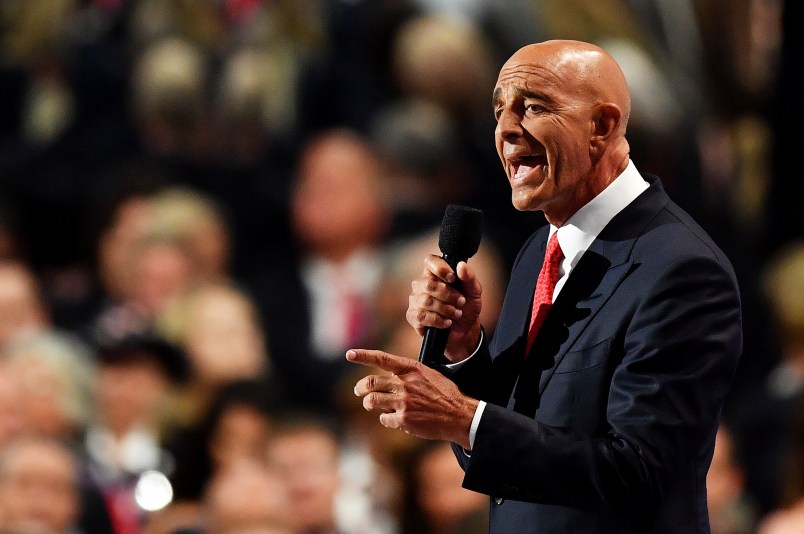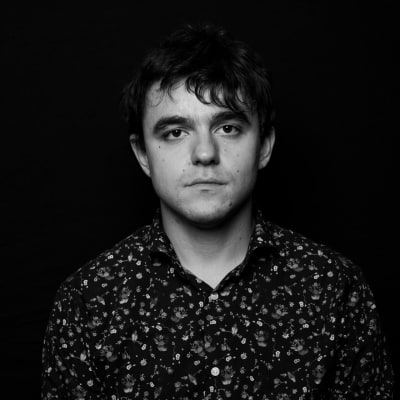Longtime Trump confidante Thomas Barrack was formally arraigned on federal criminal charges in Brooklyn on Monday, appearing in court to hear the charges against him and formally approve a bond agreement.
The billionaire businessman pleaded not guilty to all counts.
Dressed in a drab suit and with a black mask on, Barrack projected a somber air and repeatedly stood up to speak to the judge, even after being asked not to.
U.S. Magistrate Judge Sanket Bulsara agreed to impose strict travel restrictions on Barrack, demanding that he inform all private jet charter providers he had used for the past three years and send them copies of his bond agreement.
“I find that there are conditions to indicate the risk of flight is present,” the judge said.
In a later discussion of the consequences of Barrack potentially violating his historically large $250 million bail agreement, the judge said: “I believe that might wipe you out, sir.”
Barrack, the founder of Colony Capital investment firm, was arrested last week in Los Angeles.
Matthew Herrington, an attorney for Barrack, gave a brief statement to reporters outside the courthouse after the hearing.
“The charges that were presented to him today were based on information that was presented and discussed in my conference room two years ago,” Herrington said. “He is innocent, and we’re going to prove it in court.”
After the hearing, Barrack released a Horatio Alger-inspired statement suggesting that he would fight back with the heat of a late 19th-century furnace.
“The important thing for us to remember is three miles from here standing in the middle of New York Harbor is the Statue of Liberty with a torch in her hand signifying enlightenment, welcoming the seven continents across the seven seas to bring to her the immigrant masses to give them tolerance, liberty and justice,” the statement reads, referring to the hearing’s location in Brooklyn – mere miles away from the beacon to the huddled masses.
“That statue is made of steel with a patina of copper,” Barrack added in the statement. “We’re in the middle of a very heated moment and I can only tell you that the hardest steel is forged from the hottest fire.”
In addition to Barrack, Colony Capital employee Matthew Grimes was also charged, as was Emirati businessman Rashid Al-Malik. Only Barrack faces the additional charges of false statements and obstruction for allegedly lying to FBI agents during a June 2019 interview.
Grimes appeared in court with Barrack for the Monday arraignment.
Judge Bulsara went through Barrack’s bond agreement in detail at the hearing, interviewing his ex-wife, son, and an executive at his firm DigitalBridge.
DigitalBridge is the successor to Colony Capital, which Barrack founded and ran.
Barrack agreed to put up four properties as part of the bail agreement, Assistant U.S. Attorney Nathan Reilly told the judge.
In addition to that, the Trump confidante agreed post thousands of shares in DigitalBridge that he controls.
The hearing briefly devolved into acrimony after Reilly said that the government had learned that Barrack himself did not own a private jet, but rather chartered them through commercial operators or used those belonging to his companies.
Herrington, Barrack’s attorney, fumed that he was “appalled” the government had not “corrected the record,” before the judge urged the attorneys to move on.
It was then that Judge Bulsara ordered Barrack to send all of the charter providers he had used over the past three years a copy of the bond agreement, which requires that he provide the government three days notice of travel and fly only on common carriers.
Reilly also disclosed that Barrack did not appear to have any meaningful foreign financial assets or properties.
Judge Bulsara drilled into the details of Barrack’s bond agreement at the hearing, at one point asking attorneys for both sides why a public SEC filing appeared to contradict a statement in Barrack’s bond agreement. That was resolved after some discussion of what types of shares Barrack was posting.
In an interview with the judge, Barrack’s son Thomas Barrack III said that he worked for the Barrack family office, pulling in $250,000 per year. Barrack’s ex-wife Rachelle Barrack and DigitalBrigdge Chief Investment Officer Jonathan Grunzweig also spoke, saying that they would be willing to put up properties to support Barrack’s bond agreement.
Bulsara eventually decided to ban Barrack from any contact with UAE and Saudi officials or their associates, permitting him to travel from his residence in Colorado to the Eastern and Southern Districts of New York, and to the Central District of California where his family resides.
Towards the end of the hearing, acrimony flared up again after an attorney for Grimes noted that that prosecutors had already given him a batch of discovery. Barrack’s lawyers said that they were outraged that their co-defendant had begun to receive information, but that the Trump confidante had not.
Reilly, the prosecutor, said that there would be a “large volume” of discovery in the case, and promised to begin sending over material to Barrack’s team this week, after a protective order was put into place.
Herrington said that the prosecutors were acting in a “highly irregular” manner by sending discovery to Grimes’s team and not to Barrack’s — that anger persisted until an attorney for Grimes said that it had occurred after his request, saying that he “did not mean to create a thing.”
During the hearing, prosecutors suggested that two claims in a detention memo filed last week may have been mischaracterizations. One involved Barrack’s use of private jets – he purportedly doesn’t own a private jet, but rather has leased them or used ones owned by his companies. The other involved Barrack’s alleged foreign assets – in spite of his vast ties abroad, he does not appear to have substantial wealth held overseas.
According to an indictment unsealed on Tuesday, the Trump confidante faces charges of acting as an agent of the United Arab Emirates, as well as additional charges of lying to federal officers and obstruction of justice.
Barrack spent three days behind bars last week before meeting the conditions set by prosecutors for his release: posting a $250 million bond secured by $5 million in cash, and agreeing to surrender his passports and wear a GPS tracking ankle bracelet.
In a memo last week, prosecutors described Barrack as a flight risk due to his ties to high-ranking officials in the UAE and Saudi Arabia, saying that Barrack had been “charged with extremely serious offenses based on conduct that strikes at the very heart of our democracy.”
The indictment itself alleged a scheme that laid bare the kind of transactional, graft-ridden approach to diplomacy that characterized the Trump years.
Prosecutors allege that, starting during the 2016 Republican primary, Barrack agreed to act at the direction of UAE officials to influence Trump campaign policy towards the Middle East to benefit the UAE.
After Trump was elected, Barrack became chair of the then-president-elect’s inaugural committee. At the same time, he continued to leverage his access to the White House.
When the UAE and Saudi Arabia imposed a blockade on Qatar in 2017, for example, Barrack worked to persuade Trump not to react. At another point, Barrack was up for a potential nomination as U.S. Ambassador to the UAE or as special envoy to the Middle East.
Such an appointment “would give ABU DHABI more power!” Barrack wrote to Al-Malik, prosecutors said.










